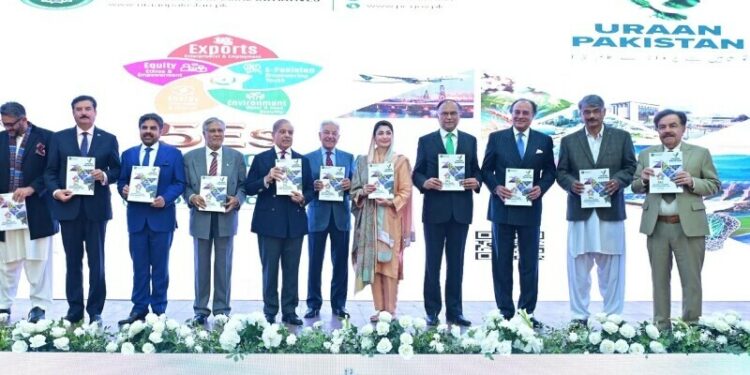Karachi’s top business leaders partner with URAAN Pakistan to drive exports, create jobs, and transform the economy by 2035.
Karachi’s Business Leaders Join URAAN Pakistan:
The leading industrialists from Karachi are now formally a part of the URAAN Pakistan plan, which was introduced by the Pakistani government. Federal Minister Ahsan Iqbal made this wonderful announcement at the Karachi Chamber of Commerce and Industry (KCCI) during his speech.
According to him, Karachi will be at the forefront of advancing this national strategy. The city, which is frequently referred to as Pakistan’s financial capital, boasts resources and bright businesspeople. The minister extended an invitation to the private sector to take the lead in implementing this plan.
URAAN Pakistan:
URAAN Pakistan is not just another policy, it is a full strategy to transform the country into a trillion-dollar export economy by the year 2035. The word “URAAN” means “flight,” and the goal is to help Pakistan’s economy take off.
Ahsan Iqbal described this plan as a roadmap for change. It focuses on shifting from:
- Low-value to high-value exports.
- Disconnected efforts to unify reforms
- Reactive governance to proactive development
Five Strong Pillars of URAAN Pakistan:
URAAN Pakistan stands on five strong pillars that cover different parts of the economy:
- Export
- E-Pakistan (Digital Development)
- Equity and Empowerment
- Environment (Green Growth)
- Energy and Infrastructure
Boosting Exports:
Pakistan has not been doing well in exports. We are selling low-priced goods in limited markets. To fix this, the government announced a new program called the National Productivity and Quality Initiative (NPQI). It will:
- Help factories upgrade their technology.
- Improve the quality of Pakistani products.
- Ensure we meet international standards.
Karachi’s industries will be the testing ground for this initiative. The KCCI will help guide factories to adopt better practices and become more export-ready. The government will also open a new Export Compliance and Innovation Center in Karachi. This centre will help exporters:
- Get needed certifications
- Meet ESG (Environmental, Social, and Governance) standards
- Handle digital trade smoothly
E-Pakistan:
The second pillar is to turn Pakistan into a digital economy. This means using technology in government, business, and education.
Key steps include:
- Building Digital Public Infrastructure
- Launching the Pakistan Innovation Fund
- Creating Digital Industrial Corridors
- Training 1 million youth in modern skills like AI, cybersecurity, and cloud computing
The minister asked KCCI to help by giving data and advice on how to improve energy use, transport, and SME productivity using technology.
Equity and Empowerment:
Growth should not just help the rich. URAAN Pakistan includes ideas to support:
- Youth development
- Women-led micro-businesses
- Small and medium-sized enterprises (SMEs)
A new program called SME Innovation Fellowship will be launched with help from KCCI. This will help students and young entrepreneurs get mentorship and support from experienced businesspeople.
Greener Industries for a Safer Future:
Karachi is at high risk from climate change. The city faces floods, waves, and water problems. To reduce these risks, a Green Karachi Business Alliance will be created.
- Businesses will reduce carbon use.
- Improve energy efficiency
- Use eco-friendly production methods.
The idea is to grow industries without harming the environment.
Energy and Infrastructure:
Industries need cheap and stable electricity to grow. Ahsan Iqbal said that Pakistan plans to use 60% renewable energy by 2030. To support industries in Karachi, the government and KCCI will create a Karachi Industrial Infrastructure Roadmap. This will help improve:
- Industrial zones
- Transportation routes
- Logistic hubs
He also pointed out that CPEC Phase II is a big chance for Karachi. It will focus on:
- Digital connections
- Industrial partnerships
- Green energy
Businesses in Karachi can benefit by forming joint ventures with Chinese firms, especially in electronics, textiles, logistics, and food processing.
Creating Jobs and Digital Growth:
The Minister urged Karachi’s business community to aim big. He gave a clear call to action:
- Triple Pakistan’s exports in seven years
- Create 2 million digital jobs.
- Support 1 million SMEs
He also reminded everyone that Pakistan has great talent and history. What’s missing is long-term policy stability.
New Council for Reforms:
To make sure the plan moves forward, a new URAAN Pakistan Business Council will be formed. The KCCI will be a founding member.
This council will:
- Monitor reforms
- Design investment plans
- Connect with overseas Pakistanis and regional investors.
This will ensure continuous progress and accountability.
Karachi’s Special Role:
Karachi is not just another city. It is the runway for Pakistan’s takeoff, as the Minister put it. It has:
- The largest industrial zones
- Leading exporters
- Key ports and logistics hubs
If Karachi becomes productive and modern, it can lift the whole country’s economy.
Why This Plan Is Different:
Many competitor articles focus on the event only. But this article looks deeper into what this means for:
- Youth looking for jobs
- Small businesses that want to grow
- Exporters are facing new international rules.
URAAN Pakistan is not just a government dream. It is a real plan with real steps and clear timelines. And with Karachi’s business community on board, success is possible.
United Effort for a Better Future:
The minister made a significant point at the end of his speech: peace and stability are necessary for economic progress. Other nations with long-term objectives and political unity, such as China, South Korea, and Thailand, expanded. They must teach Pakistan a lesson. The Uraan. For the government, corporations, youth, and society as a whole, Pakistan is a blueprint. We can ultimately transform Pakistan’s economic narrative from one of hardship to prosperity if everyone does their part.
URAAN Pakistan is a bold new plan to make Pakistan a trillion-dollar economy by 2035. Karachi’s business leaders are now official partners in this national journey. With digital reforms, green growth, and export improvements, the plan covers all key sectors. Political stability and public-private unity are essential for its success.























